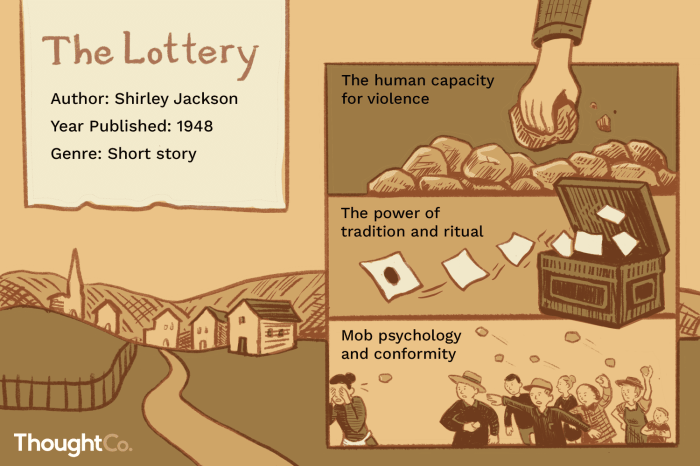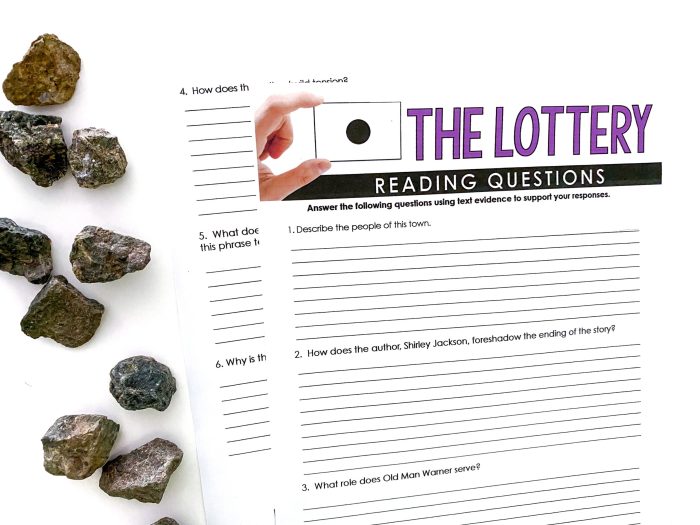The lottery shirley jackson questions and answers delve into the depths of Shirley Jackson’s iconic short story, offering a comprehensive exploration of its intricate symbolism, thought-provoking themes, and enduring legacy. This literary masterpiece has captivated readers for generations, and this guide provides a deeper understanding of its enigmatic elements, leaving no stone unturned.
Jackson’s “The Lottery” is a haunting tale that exposes the dark underbelly of human nature, challenging our assumptions about tradition, conformity, and the dangers of blind obedience. Through a series of carefully crafted questions and answers, this guide unravels the story’s hidden meanings, inviting readers to engage in a critical analysis of its profound insights.
The Lottery: Overview and Background
Shirley Jackson’s “The Lottery” is a short story that presents a chilling depiction of a small town’s adherence to a sinister tradition. The premise revolves around an annual lottery held in the village, where one unlucky individual is randomly selected to be stoned to death.
The story’s setting is a rural town in the United States, possibly in New England, where the tradition of the lottery has been passed down for generations. The villagers cling to this custom out of a misguided belief that it ensures a bountiful harvest.
Historical and Cultural Context
“The Lottery” reflects the post-World War II era, a time of social and political upheaval. The story’s themes of blind conformity and scapegoating resonate with the Cold War atmosphere of fear and paranoia.
Additionally, the lottery can be seen as a metaphor for the McCarthy hearings, where individuals were unjustly accused and condemned based on flimsy evidence.
Symbolism and Allegory

Symbolic Elements, The lottery shirley jackson questions and answers
- The Lottery:Represents blind tradition, mob mentality, and the dangers of conformity.
- The Black Box:Contains the slips of paper used in the lottery, symbolizing the randomness and anonymity of the victim selection.
- The Stones:Used to stone the victim, representing violence, retribution, and the dehumanization of the individual.
Allegorical Interpretations
“The Lottery” has been interpreted as an allegory for various themes, including:
- Tradition and Conformity:The villagers’ unwavering adherence to the lottery ritual highlights the dangers of blindly following tradition, even when it leads to senseless violence.
- Scapegoating:The lottery serves as a mechanism for the villagers to release their frustrations and fears by scapegoating an innocent victim.
- The Loss of Individuality:The lottery reduces the villagers to a collective mob, where individual identity and autonomy are suppressed.
Characters and Their Roles

Tessie Hutchinson
The protagonist of the story, Tessie is a middle-aged woman who initially participates in the lottery without question. However, as the selection process unfolds, she realizes the horror of the tradition and desperately tries to escape her fate.
The Villagers
The villagers are a collective entity, driven by blind conformity and fear. They blindly follow the tradition of the lottery, even though they secretly harbor doubts about its morality.
Themes and Social Commentary: The Lottery Shirley Jackson Questions And Answers
Central Themes
- The Dangers of Tradition:“The Lottery” critiques the blind adherence to tradition, arguing that it can lead to senseless violence and the suppression of individuality.
- Mob Mentality:The story illustrates how a group of individuals can be swayed by irrationality and prejudice, leading to horrific consequences.
- Scapegoating and Ostracism:“The Lottery” highlights the human tendency to blame and ostracize those who are different or perceived as a threat.
Social Commentary
Jackson’s story serves as a powerful indictment of social conformity and the dangers of blindly following authority. It challenges readers to question the validity of traditions and to stand up against injustice, even when it is unpopular.
Literary Devices and Techniques
Foreshadowing
Jackson uses subtle hints throughout the story to foreshadow the tragic outcome. For example, the mention of the “black box” and the villagers’ reluctance to participate in the lottery create a sense of foreboding.
Irony
The story is filled with ironic moments, such as the fact that the lottery is held to ensure a good harvest but results in the death of an innocent person.
Suspense
Jackson builds suspense by gradually revealing the details of the lottery and by focusing on Tessie’s growing fear and desperation.
FAQ Explained
What is the significance of the lottery in the story?
The lottery serves as a powerful symbol of tradition and conformity, blindly followed by the villagers despite its horrific consequences. It represents the dangers of unquestioning adherence to customs, even when they are cruel and unjust.
How does the story explore the theme of scapegoating?
The lottery ritual acts as a form of scapegoating, where the villagers project their fears and frustrations onto Tessie Hutchinson, the unfortunate victim. This highlights the human tendency to find a convenient target for blame, rather than confronting their own issues.
What is the role of foreshadowing in the story?
Jackson skillfully employs foreshadowing throughout the story, creating a sense of unease and dread. Subtle hints and allusions, such as the children gathering stones, gradually build tension and prepare the reader for the shocking conclusion.
How does the story critique mob mentality?
The villagers’ behavior during the lottery demonstrates the dangers of mob mentality, where individuals blindly follow the actions of the group, even when they know it is wrong. This highlights the importance of independent thought and the need to question authority.
What is the allegorical interpretation of the story?
The lottery can be interpreted as an allegory for the dangers of totalitarianism and the suppression of individuality. The villagers’ unquestioning obedience to tradition symbolizes the ways in which oppressive regimes can control and manipulate their citizens.

